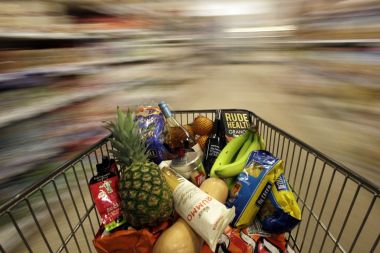One in three foodbank users are children – new report
One third of people receiving emergency food in at least one area of Britain are children, a new report released today has reveaed.

The #stillhungry report, produced by the West Cheshire Foodbank in partnership with the universities of Chester and Oxford, found that benefit sanctions were responsible for more than seven per cent of referrals, and of those affected by benefit sanctions, more than one in five was a child.
Benefit changes accounted for 14 per cent of referrals, and nearly one in five was due to low income.
In total, 5,808 households were referred to West Cheshire Foodbank between May 2014 and April 2016. One third of those receiving help were children, and food parcels were distributed to people living in all 46 wards of Cheshire West and Chester – not just disadvantaged areas.
Researchers found that those aged between 17 and 64 were typically referred due to problems with benefits, while those aged 65 and older were more likely to use the foodbank because of debt and low income.
The report called for immediate improvements to job centres, reformed benefit sanctions policy and practice, and improved access to local welfare assistance schemes.
"In a prosperous country, it is completely unacceptable that national policy consistently fails to respond effectively to the evidence that on-going hunger remains a reality for increasing numbers of people," said Rev Christine Jones, chair of trustees at West Cheshire Foodbank.
"In order to avoid foodbanks becoming a permanent part of the welfare furniture, it is critical that we all understand and act on the drivers of food poverty together."
Dr Elisabeth Garratt, who is based at Oxford University and authored the report, said that the research "demonstrates the persistence of hunger in 21st century Britain".
"Referrals have risen in 2016 and there is every indication that foodbanks are here to stay," she added. "One in three people receiving emergency food from West Cheshire Foodbank is a child, indicating shocking levels of poverty that are unacceptable in a country as wealthy as ours. Despite enormous commitment on the part of volunteers, the provision of emergency food cannot address the underlying and long-term causes of food poverty. We call upon the Government to take effective steps to ensure that foodbanks do not become an established part of our society."
David McAuley, CEO at The Trussell Trust which runs a network of foodbanks across Britain, called on new Prime Minister Theresa May to "make social justice the centrepiece" of UK policy.
"Now more than ever we must work together to ensure fewer families face poverty," he said. "There's an opportunity for all of us to look at the body of evidence in the report, particularly on sanctions, where an alternative approach would help tackle the underlying causes of hunger."











